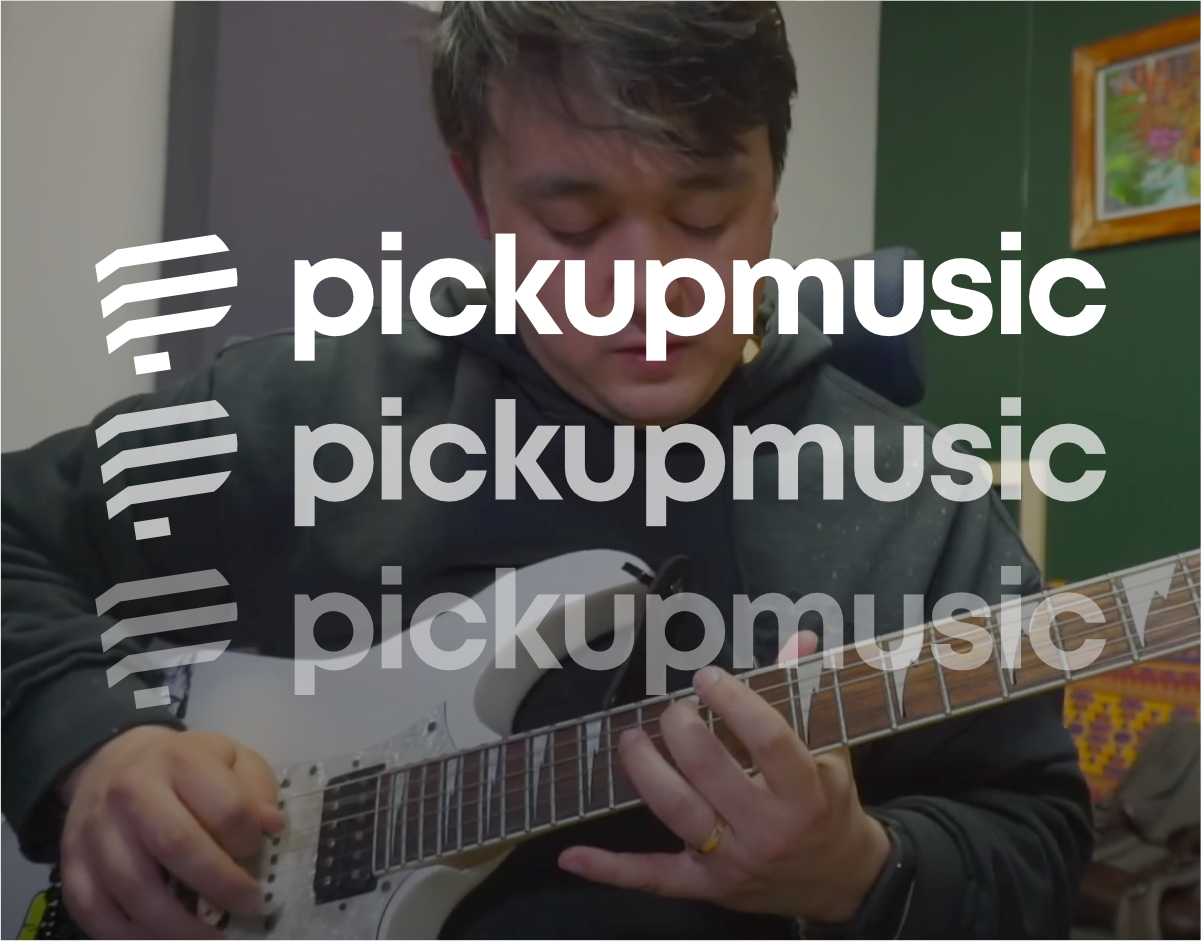I used to think playing the guitar was just something other people could do.
You know the type: flawless rhythm, effortless solos, like the music flowed out of them. Meanwhile, I was stuck in the same loop—missing notes, losing tempo, and wondering if I’d ever get it.
It was frustrating. Almost enough to quit for good.
But then, I found something that changed everything.
It wasn’t magic. It wasn’t luck. It was a system—a way to actually make progress, step by step, without feeling like I was starting over every time I picked up my guitar.
That system is Pickup Music.
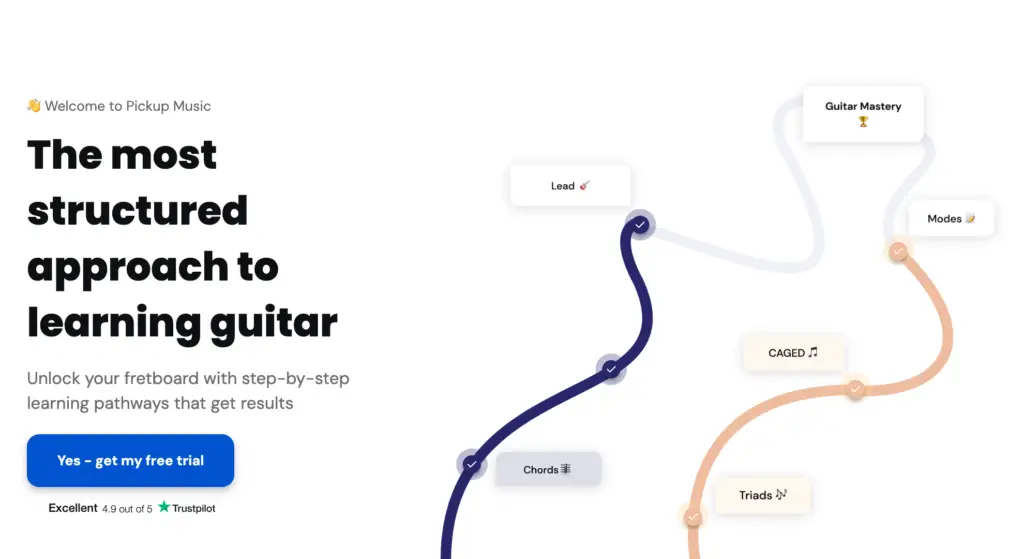
This isn’t your average YouTube tutorial or “quick hack.” It’s a full-on roadmap.
After spending over 100 hours with Pickup Music, I’ve made breakthroughs I thought would take years. And today, I’m going to break down exactly what this platform offers:
- Lessons so well-produced you actually want to keep practicing.
- A variety of courses that grow with you, no matter where you’re starting.
- A community of players and events that keep you motivated (and accountable).
- And a structure designed to eliminate guesswork—so you can finally move forward.
If you’re tired of feeling stuck, and ready to make real progress, let’s dive in.
My Guitar Struggle
During middle school, like many others, I began playing guitar with hopes of becoming a rockstar.
Fast forward 15 years, and life got busy.
Although I could play some riffs, I lacked a structured approach and struggled to keep rhythm with backing tracks.
My playing felt stagnant, and the joy of making music had faded.
Eventually, I put the guitar down…
and slowly forgot about it.

That all changed 6 months ago and I have now been on my longest stint of continued practice in 15 years.
I’m going to tell you how I did it.
My 6 months with Pickup Music
I want to give you a deep dive into my journey so far with Pickup Music so you can see how it is structured and for you to decide if it will fit your learning style and level.
When you first sign up, you get a 14-day free trial.
I wanted to make the most of it.
It was pretty easy to decide on a course, or “Pathway”, because they have some onboarding questions and a chat system where you can ask for advice if you’re unsure where to start.
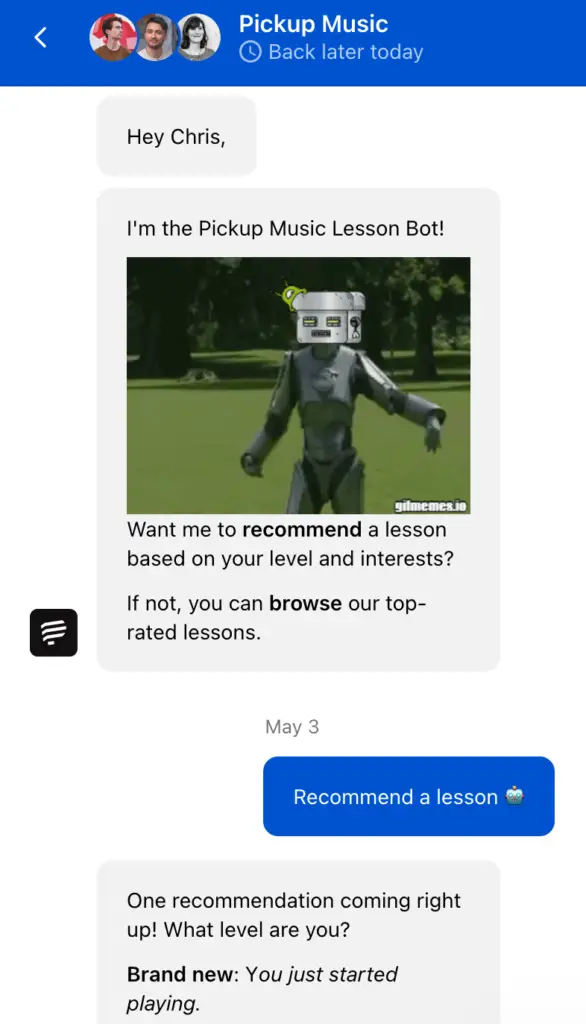
So I decided to start with “Late Beginner” because after 15 years of noodling and unguided practice…I forgot a few things, to say the least.
Late Beginner
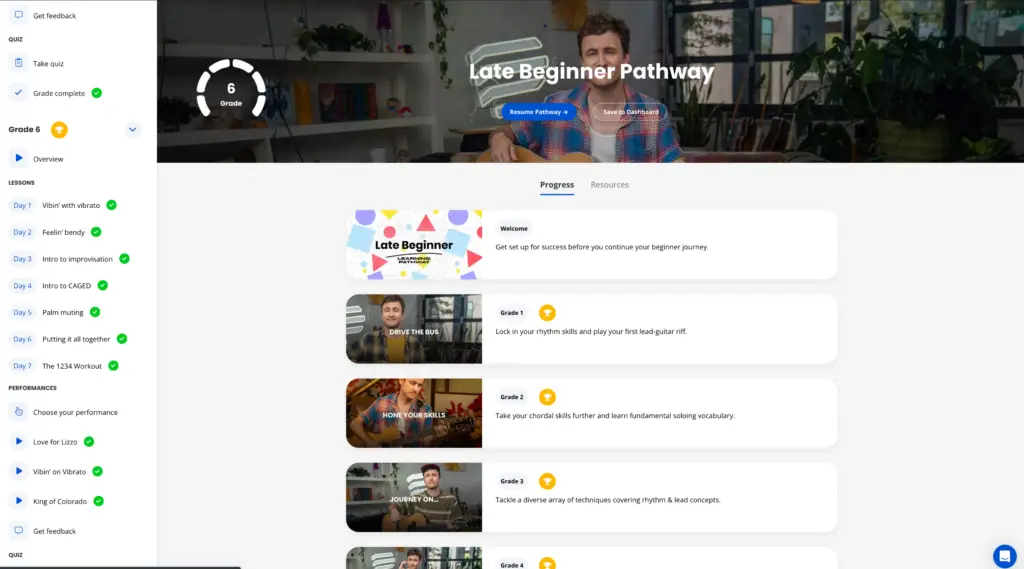
So, I’ll give you a basic outline of a “Pathway” to make it easier to follow along.
Pickup Music uses a structured learning system called “Pathways.” Each Pathway is like a roadmap, consisting of 6 Grades with 7 lessons per Grade.
The lessons are well-organized and focus on applying what you learn.
A key feature of the Pathway is the use of original songs as performance pieces. Students record themselves playing these pieces and submit them for personalized feedback from experienced coaches.
For example, the “Drive the Bus” lesson focuses on basic rhythm with engaging exercises using popular chord progressions.
This had a bunch of exercises to practice different rhythmic divisions to a popular chord progression.
At the end of the lesson there is a Jam where you have to play along with what you learned without tabs, which I’ll go into later, but is a huge benefit to internalizing it.
You can check out the full curriculum at their website with full details
Fast forward 7 days…
I refreshed my memory and learned some new chords and some nuggets of information and now it’s time for the 1st performance piece.
Unfortunately, I don’t have the recording…
But I have the feedback.
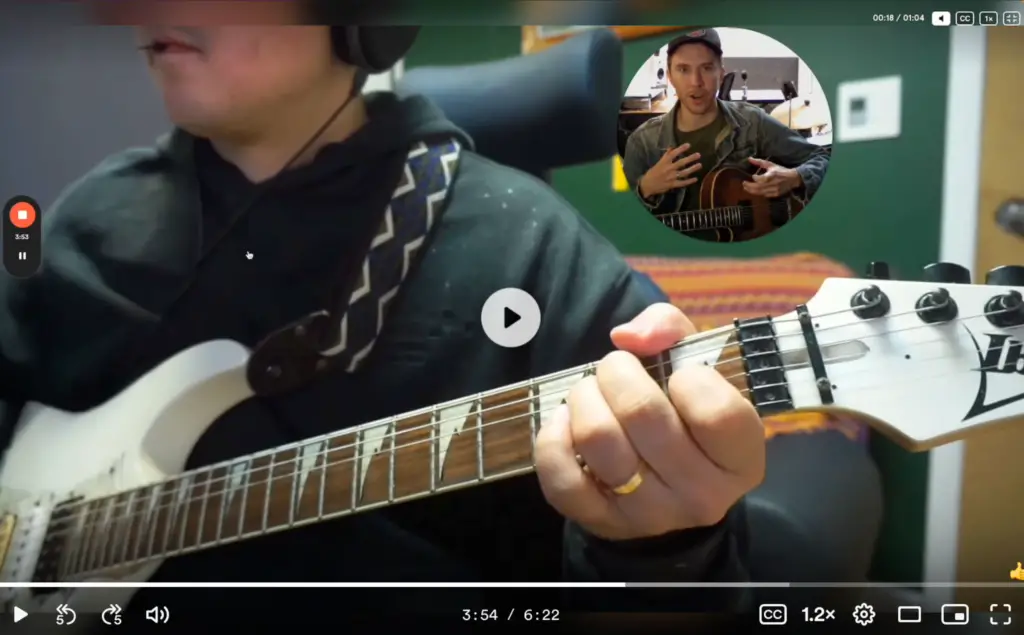
One of the highlights of Pickup Music is the personalized feedback system.
This is Ben.
He has provided in-depth feedback on 4 of my performance pieces so far. It truly feels like he’s on this journey with me – referencing past feedback and tailoring his comments to my specific areas of improvement.
Moving through the Late Beginner Pathway here are some of the topics covered
- Essential Techniques: Bar chords, 7th chord shapes, power chords
- Playing Styles: Intro to fingerstyle, blues rhythm & lead techniques
- Music Theory: Major Scale, Major Pentatonic, I vi IV progression (and likely more!)
…just to name a few
Thanks to Ben’s feedback, I’ve seen significant improvement in areas like keeping time with the music and mastering palm-muted arpeggios (which we’ll see in the next section).
Grade 3 – Blues Lick
Since I didn’t have much experience playing long pieces, I struggled to keep my place in the music.
“Do I need to repeat this line 1 more time?”
“Do I need to wait one 1 measure before coming in?”
“Oh, I came in too early..”
The personalized feedback from Pickup Music was invaluable here. After submitting my performance, they provided specific tips on how to internalize rhythm, which significantly improved my timing.
Grade 5 – Quick Switchin’
The challenge I faced with this track was the intro and keeping the rhythm of 8th notes against only hearing the drum beat on the 2 and 4.
Grade 6 – Love for Lizzo
Grade 6 introduced palm-muted arpeggios. While I nailed the chords, the arpeggios needed work.
Here again, the feedback was spot-on, providing guidance that helped me improve this technique.
We’ll see how I put these palm-muting skills to use in the Intermediate level.
After finishing the Pathway, I got this nice little certificate.

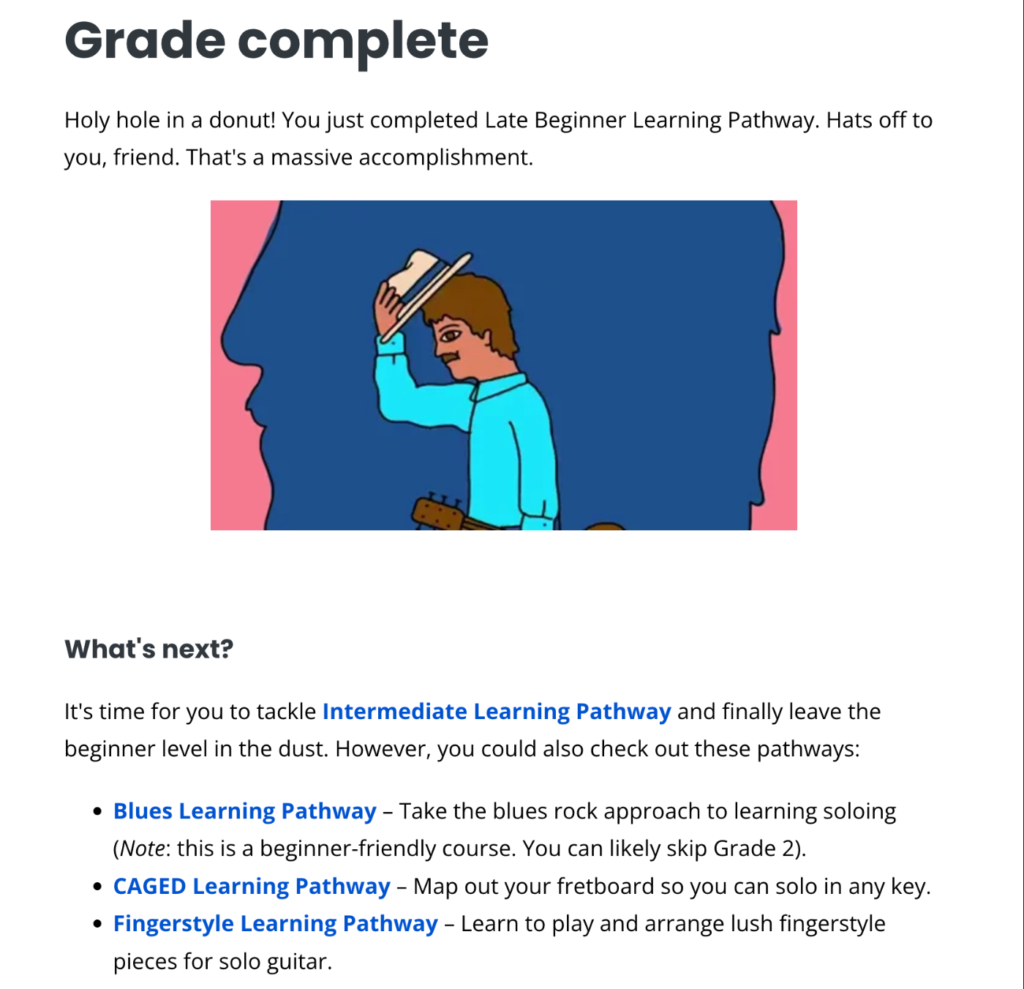
Moving on to Intermediate…
Intermediate Grade and CAGED
One key focus in this level was injecting feeling into your playing. Lessons explored techniques like phrasing and dynamics to add expression.
For my performance piece, I chose “Ouchie,” a track that (perhaps fueled by a touch of ego!) turned out to be the most demanding yet.
Intermediate Grade 1 – “Ouchie”
But this track “Ouchie” is the one I had the most fun with and put in the most practice with.
I had the most difficulty with keeping time with the single string like as some notes are syncopated.
This experience highlighted a recurring theme in Pickup Music’s approach: even seemingly simple melodies can pose nuanced rhythmic challenges that ultimately help you grow as a musician.
Grade 2
This is more about lead so we go a little deeper in the scales.
The performance piece here is a Khruangbin-inspired tune with an emphasis on lead playing.
As you can hear, my palm-muted arpeggios have come a long way thanks to the feedback and practice from the Late Beginner Pathway!
So grade 3 is where I am currently at.
I have also started working on adding CAGED pathway lessons.
You know… I haven’t only been doing the Pathway lessons.
They provide weekly live Zoom lessons that are accessible to view on demand. These lessons cover a wide range of topics, from jamming techniques to production essentials.
I found the “Production Week” lessons particularly useful. Learning about drum programming and songwriting from a producer’s perspective was super helpful.
Afterward, I decided to apply the lessons and I worked on programming the drums in MIDI from one of the performance pieces by ear.
The confidence boost I gained from these additional resources, combined with the structured lessons, empowered me to start working on my own music.
I see Pickup Music as a way to become a better MUSICIAN through guitar.
My Core Takeaways
Learning through Pickup Music was able to help me in all the ways I was struggling.
I couldn’t find a good practice routine…SOLVED.
I couldn’t get feedback on my playing…SOLVED.
I couldn’t learn songs in a musical way…SOLVED.
I got past the difficulty of trying to be a self-taught guitarist who didn’t have a lot of time. I didn’t want to spend half my time planning what I needed to learn but spend more time learning.
Does that sound familiar to you?
I don’t have to worry about that now, or at least, worry about it a lot less.
Also, I feel that it has a more musicianship-oriented approach that has made me a better musician not just a better guitarist.
Okay so enough about me and my journey…
How can Pickup Music help YOU?
No matter if you are a complete beginner, intermediate, or even an advanced player there will be something for you to learn and improve your guitar playing.
But it is focused on the beginner and intermediate players.
The advanced players may benefit from exploring some of the different pathways of genres they have less experience with.
I would consider myself a lower-intermediate player, and I would have to say there are YEARS worth of lessons on the platform that are laid out in a clear, linear path toward mastery in – not only guitar but also overall MUSICIANSHIP.
Pickup Music a Deeper Dive (Review Details)
Lesson Quality – Videos
Pickup Music’s video lessons stand out with multiple angles, downloadable backing tracks, and interactive tabs that let you slow down the teacher.
Each lesson has multiple videos detailing every stage of the lesson such as:
- Overview video
- Individual exercise videos
- Jam Video
You get multiple angles so you can get a clear visual of what is being played no the guitar
At the end, you get a backing track tailored to the exercises from the lesson, but you can get creative when jamming over it.
The interactive tabs allow you to loop over sections of the video and change the playback speed.
I know I had to do that a few times with some of the more difficult exercises.
Teachers
As highlighted earlier, while the video production level is impressive, it’s the teachers who truly add value to the learning experience. Their expertise and guidance are invaluable, making the course an excellent investment for anyone seeking to improve their skills.
The teachers I have watched and received feedback from have all been top-notch and entertaining to learn from. Karl brings a lot of character and charm to his lessons in the Late Beginner and Intermediate pathway.
Course Types
Pathway courses are not the only lesson types they offer. Let me explain briefly.
- Masterclass – shorter groups of lessons that focus in-depth on a particular playing style or genre (usually about 10 lessons)
- Songsquad – where Pickup Music instructors perform their own songs and take you through them step by step
- Essential Licks – short video lessons that cover all the elements of a specific lick
- Artist Toolkit – longer form lessons and interviews that give insight into the life of a professional guitar player
- 5 Minute Lessons – quick lessons that cover a specific aspect of the instrument in 5 minutes
- Live Lessons & Replays
Something that should be mentioned is that everything here is all original music from the Pickup music team or the instructor’s own songs as in the Song squad lessons
Each lesson is short enough to tackle in just 10-20 minutes. So, even if you’ve got a hectic schedule, you can still get your guitar fix and improve your skills.
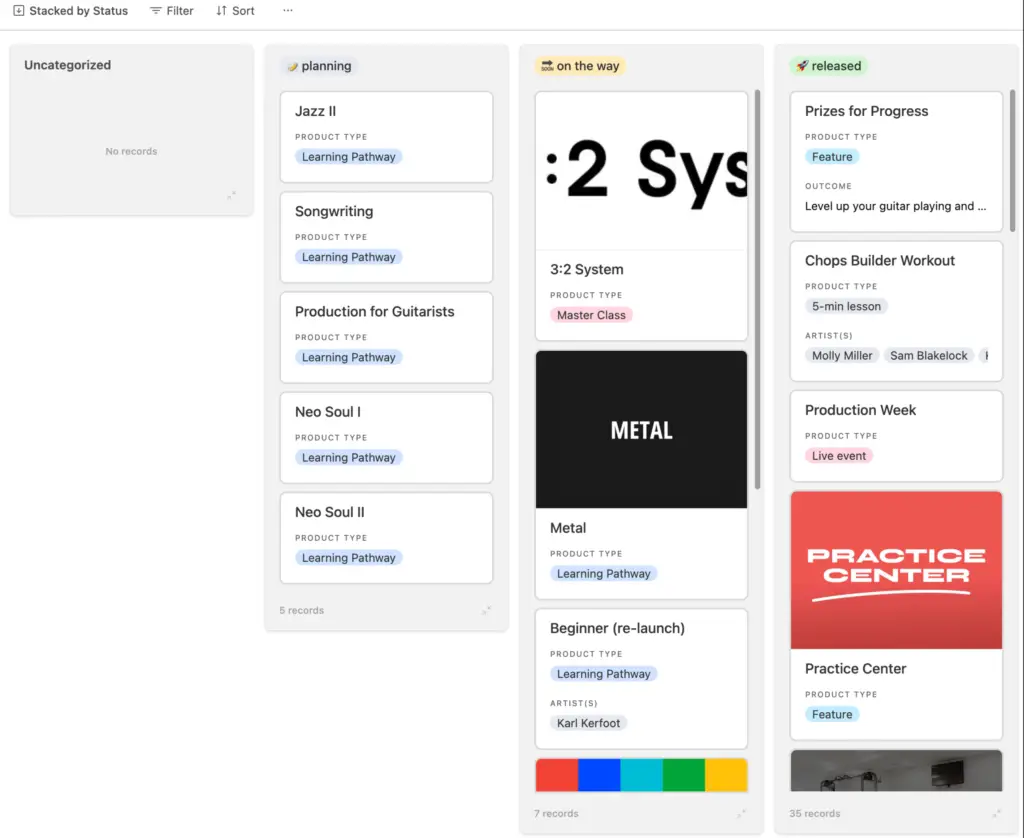
They are constantly adding new courses and lesson material. You can check out what they have in the works in their public roadmap.
Personally, I am excited about the Metal and Songwriting Pathway!
Feedback

The 1-on-1 feedback system is something I have found unique to Pickup Music. I haven’t heard of a platform giving this kind of feedback and would usually only expect it if I were taking private lessons.
They have a range of trusted coaches who are active in the Pickup Music Community and record video feedback on the performances you submit.
I have had feedback range from 4 to 7 minutes long, but the length doesn’t matter – it’s the value you get out of it, right?
Well, I have found them very valuable, and I am super excited when I get an email saying that the feedback has arrived.
Here is a link to one of my feedback videos
Community and Events
Pickup Music also has a community corner. They have a very supportive community of other guitarists who post videos of their progress and share information.
Pickup Music hosts live chat sessions or Q&A events with instructors. This can be a great way to connect with other students and get answers to your guitar-related questions.

They also have week-long live lesson events which focus on different aspects of music and production. Here are some that I have seen during my time at Pickup Music:
- Production Week
- Jamming Week
- Ear Training Week
Don’t worry if you can’t make it live!
They post replays of all the live lessons in the community section.
Pricing and Value
You might be wondering, “Is Pickup Music worth the investment?”
Let’s talk about the cost.
Traditional guitar lessons typically range from $30 to $60 per hour, depending on your location and the teacher’s experience. That adds up quickly, especially if you’re aiming for consistent progress.
At $40 per hour for two lessons a week, you’d spend over $4,000 a year. With Pickup Music, you get unlimited access for less than $200.
At $40 per hour for two lessons a week, you’d spend over $4,000 a year. With Pickup Music, you get unlimited access for less than $200.
Pickup Music offers a much more affordable alternative without sacrificing quality. With an annual plan at just $179.99 (that’s less than $15 a month), you gain access to hundreds of hours of expertly crafted lessons, personalized feedback from experienced coaches, and a supportive community. It’s like having a personal guitar tutor available 24/7, at a fraction of the cost.
And if you’re unsure about committing to a full year, the monthly plan for $29.99 is a great option to test the waters. Plus, you can start your journey completely risk-free with the 14-day free trial.
Pickup Music’s free trial gives you the chance to experience their in-depth feedback and practical learning style.
When I went through the trial, I was able to complete a grade record a performance piece within those 14 days and get some awesome feedback.

Final Thoughts
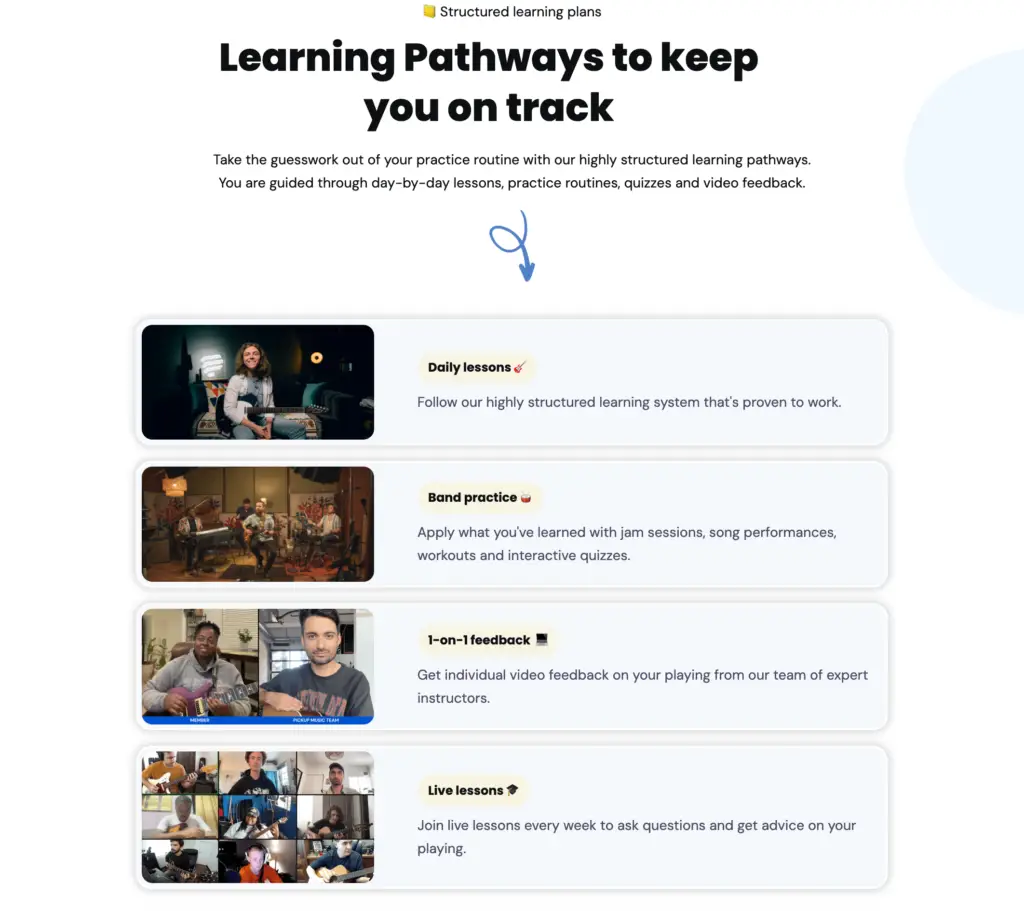
So, is Pickup Music the right platform for you? Here’s the bottom line:
- Structured Learning: If you thrive with a clear roadmap and focused lessons, Pickup Music’s Pathway system is fantastic.
- Personalized Feedback: The in-depth, personalized feedback from experienced coaches makes a real difference in identifying your weaknesses and guiding your improvement.
- Practical Application: Pickup Music goes beyond theory, emphasizing practical skills through exercises, jamming, and performance pieces.
- Beginner to Advanced: While I focused on the Late Beginner Pathway, Pickup Music caters to learners from beginner to advanced levels.
